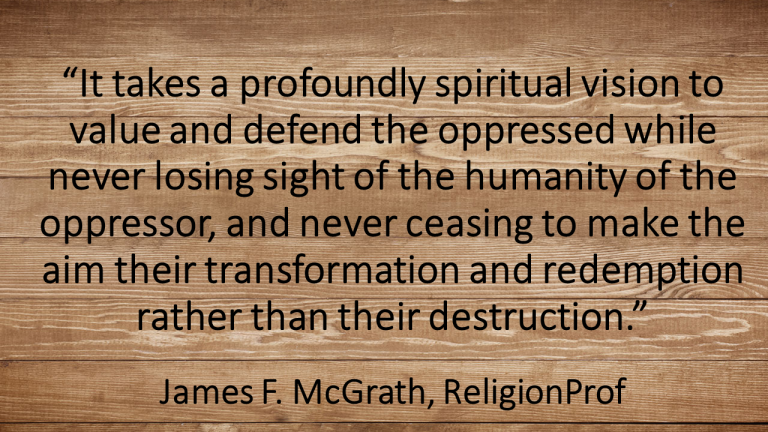Jim Burklo offers this helpful illustration between Christianity and cooking, between the Bible and a recipe book.
Imagine that you memorize a book of recipes. You quote passages from the recipes, with breathless enthusiasm, to other people – whether they care to listen or not. You follow each recipe to the letter. You chop and mix and bake and cook according to the instructions. You show off the finished product, proclaiming its absolute superiority to all others.But you never bother to eat the food.Conservative Christianity is like that. It’s all directions, but no dinner. Because if you actually ate the food, you might or might not like it. There are recipes that, if faithfully followed, will produce bland, boring, unpleasant, and even nasty dishes. Because rigidly orthodox religion worships the recipes, actually eating the results might lead to questioning them.That’s why conservative Christian preachers warn against trusting your emotions when interpreting the faith. Your emotions and your subjective experiences are like taste-buds. A bitter orthodox teaching should be obeyed on authority, and not be subject to evaluation by your God-given sensorium. Oh no no no, don’t follow your gut. Don’t follow your nose or your tongue before you even get to your gut. Follow those megachurch pastors and long-robed clerics who declaim with stentorian gravitas from their pulpits, ordering you to eat the recipe, but not the food.But I say try out the recipes in the Bible and in the Christian tradition. Taste and see. Don’t memorize the faith and gush about how perfect it is. Practice it, which is a much messier business. Don’t just talk about God. Taste God in mystical contemplation. If the results are great, consider repeating the exercise. If you follow a religious recipe and get perfectly prepared lutefisk, which tastes like the residue left in a sink trap after a Drano treatment, consider shelving that one and trying another. If you get okay results with a biblical recipe, but get a bright idea for improving on it – maybe even radically altering it – go for it. Be playful and free-spirited. A dash of this, a dash of that. Don’t be a slave to the details. Experiment with the recipes of the great mystics and contemplatives of the Church over the past 2,000 years. Poke your finger in the batter and lick it. If it works for you, make it part of your repertoire. Trust your taste. If if doesn’t pass that test, play further with the ingredients or move on to something else. Come up with your own recipes! There’s always room for innovation in the Christian kitchen.
Click to read the rest. Along similar lines, Richard Beck found that his theological journey made him think of soup. See too Vance Morgan’s recent post on arguments about the existence of God, which includes two quotes from different sources, from which the following are excerpts:
[N]othing true can be said about God from a posture of defense.
and:
One sin I have come to fear more than any other is certainty. Certainty is the great enemy of unity. Certainty is the great enemy of tolerance . . . Our faith is a living thing precisely because it walks hand in hand with doubt. If there was only certainty, and if there was no doubt, there would be no mystery, and therefore no need for faith.
Visit his blog to see them in the context of his post, and to find out where they come from.
Here’s a cartoon from David Hayward about different perspectives on what he unhelpfully calls “deconstruction” – by which he doesn’t mean it in the sense that Derrida made famous and which everyone else associates with it, but “the changing of life-long hard-held beliefs… the loss of faith.”
And finally, thanks to commenter Daniel Wilcox for encouraging me to turn a quote from yesterday’s blog post into a meme!














